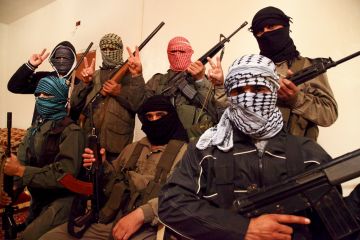 Ghaith Abdul-Ahad reports for The Guardian of London:
Ghaith Abdul-Ahad reports for The Guardian of London:
The route across the Syrian border was marked by a single shining piece of string. It stretched from the road on the Turkish side for a few hundred metres to the steel and razor-wire fence that ran along the boundary.
The smugglers followed it silently and quickly, jumping from one stone to another in the moonlight. Each man carried a thick, plastic-wrapped load on his back. The plastic bundles rattled and clinked as they ran along.
Beyond the fence the shadows of men and animals moved. "Do you have money?" asked a Turkish voice.
"Next shipment," the Syrian replied.
A man with a scarf wrapped around his face held the coils of barbed wire flat while the cargo was passed across and loaded on to the backs of the waiting mules. Then the men hurried the animals away from the border and up into the mountains of northern Syria.
The smugglers paused on a cliff to examine the cargo. Inside the plastic packages were small boxes filled with pistols and bullets of different calibres.
One of the men broke off to answer his mobile phone. It was one of several lookouts keeping watch for Syrian security forces. There was a government patrol on the mountain: the men had to split up and move quickly.
"Grab the mule's reins and run along next to it," a smuggler hissed. In this fashion we climbed further into the mountains, playing cat and mouse with the Syrian patrol.
At the edge of a small village we lay in a ditch and waited. A man whistled and a white truck appeared. It had come to collect the cargo.
After eight months of vicious crackdowns by the regime of President Bashar al-Assad, Syria's revolution is sliding towards civil war. Many in the opposition who have seen their friends and family members disappeared, tortured or shot by the Syrian security forces are looking for ways to fight back.
The smugglers, sensing a business opportunity, have been quick to respond. In the south the weapons come from Lebanon. Here in the north, they are flowing in from Turkey and Iraq.
"We used to smuggle cigarettes coming from Lebanon via Syria," a portly man told me the night before in Turkey as he channel-hopped between Egyptian chatshows. Since the Syrian uprising began new business opportunities had opened up. "Now we only do weapons," he said. "Three shipments per day."
After crossing the border into the north Syrian province of Idlib, we travelled to meet the revolutionary command council with Muhyo, a fighter, and Abu Salim. Abu Salim had made it his job to find weapons and ammunition for the rebels after running out of bullets during a firefight with the regime. .
"When the army came to [the town of] Benish last time, we ambushed a bus filled with security people," he said. "I had a pistol and eight bullets, but after a few minutes of shooting I had run out. I stood there watching those dogs but had no ammunition. That's when I decided I would arm every man in my town."
Now he spends his days driving through villages and deserts, meeting smugglers and weapon dealers, scavenging bullets and old rifles. Each day he comes back with a gun or two and few bags of ammunition. "The last time the army attacked Benish there were 30 Kalashnikovs in the town," he said. "Now we have more than 600."
In this part of Syria, the young men tell how they have sold their wives' jewellery, their cars and even their furniture to buy weapons and ammunition. "A man would rather sleep with his Kalashnikov than his wife," they say in Idlib.
Were they getting any support from outside Syria? Abu Salim laughed. "There is no outside support," he said. "You have seen how hard it is to get ammunition: the price of a bullet is $2, and an old Kalashnikov is $2,000."